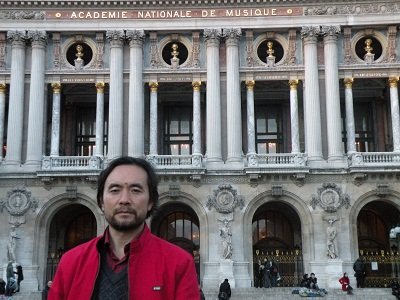
Freedom and Liberation: The Light of Our Soul
Xuemo
The freedom and transcendence I mentioned here is quite different from what Westerners understand it. The freedom they talk about is made possible mainly by their political system, material conditions, and constitution. The freedom I talk about is unconditional freedom, which is the light in everyone’s soul. This light is independent of the conditions of the external world. The transcendence can be achieved within one’s soul. In fact, the restriction, limitation, and bondage that we feel do not come from the things of the world, but from our soul. For our soul is filled with all kinds of concepts, or what we call “discriminations.” It is fettered by human language. That is, all human sufferings and afflictions come from the many concepts in one’s soul, which fetter oneself. According to Oriental philosophy, the brilliance of the human soul will reveal itself after the filth of greed, ignorance, and hatred is purged from it – just as Jesus has shown us. Once a person finds the light in his soul, he achieves transcendence.
The freedom of Westerners is like the moon. It relies on external forces such as law, material, or political system. The freedom sought by Oriental people is like the sun, which illuminates the world with its own light rather than being illuminated by the world. That’s the difference.
In other words, to Oriental people, freedom implies that the magnanimity and love of one’s soul grows to such an extent that it is on equal terms with the world. By then, the world can no longer corrode your soul; indeed, your soul has become a broad world. Therefore, the transcendence achieved by Oriental people is the enrichment of one’s soul, the elimination of the dirt on it, and illuminating, as the sun does, the world, whether there is light there or not. I mean, it doesn’t matter whether or not there is light in the world already, for my soul gives out light.
How can the transcendence be achieved in literature, then? The major function of literature is purification, purification of one’s soul. To a writer, freedom will be achieved only when he has real subjectivity, that is, when his soul becomes so magnanimous and profound that it is able to absorb all the nutrients of the world but without giving in to all the temptations of the world. What are the manifestations of his freedom, then? His heart is filled with great compassion and he is free from cares. He feels that the world has already given him much. He will not be so greedy as to try to get more. He is satisfied with the glass of water that Nature gives him. He feels the beauty of Nature and he receives everything from her with gratitude. He will never seize more water than he needs. Thanks to this world view, he is free from greed and he does not suffer. Naturally, he is free from afflictions.
The freedom in Mahamudra① culture implies, first, having great compassion and universal love in one’s heart but without afflictions caused by greed. Second, a free man is happy. It is a spontaneous sense of happiness, without any desire. It is one’s desire that makes one feel the temptations in the world. A free and self-contained soul is aware of its desires but it is not interfered by them. A free man’s soul is like a mirror that reflects everything in a room. It remains quiet in spite of people coming in and going out. Nothing can disturb its quietness. The wisdom sought by Oriental people is like the mirror. It is aware of all the people coming and going in the room, but it is not pleased by a beautiful woman nor annoyed by any man. It is already a complete world. Oriental people seek to have the mirror-like wisdom, which reflects the whole world but is never affected by it.
——From Xuemo’s speech at the Institut de France
Mahamudra: literally, the “Great Hand Seal.” “Great” indicates great mind, great perception, and great compassion; “hand” implies an emphasis on action and contribution to society; “seal” symbolizes the primordial wisdom confirmed by one’s guru.
Notice
Translated by non-professional volunteers, there would be some inaccuracies in the translation. You are welcome to offer us some advice for emendation. Please feel free to contact us. We also look forward to you joining our voluntary translation team.
Please contact us at suonanzhuoma1988@163.com, thank you.
自由和解脱是点亮自心的太阳
雪漠
我所说的自由和超越与西方人所说的自由和超越是不一样的。西方人所说的自由,更多地是由制度、物质、宪法等来保证。我所说的自由,是无条件的自由。什么是无条件的自由?就是每个人心中都有一种光明,这种光明不一定依靠外部的世界、外部的条件来实现超越,而是在自己心中、在自己的内心就能实现一种超越。这个世界上虽然有许许多多的东西,但那种对我们的限制、局限、束缚并不是来自这个世界,而是来自我们的内心。因为我们的内心中,充满了各种概念,我们称之为“分别”、“概念”----就是人类的语言对自己心灵的束缚。所有人类的痛苦、烦恼都源于自己心中的诸多概念对自己的束缚。东方哲学认为,当人类通过清洗自己内心的污垢,通过清洗自己内心的贪婪、愚昧、仇恨,扫除了诸多的垃圾之后,人类本有的、像耶稣那样伟大的心灵的光辉就会焕发出来。当一个人的心中拥有了这种光明之后,他就实现了超越。
换一句话说,西方人的自由更多的像月亮一样,它借助一种外界的力量,包括法律、物质、或其他的一种制度性的保障来实现自由。东方人不是。东方人追求的自由像太阳,它本身要能发光,它要去照亮这个世界,而不是让世界照亮它。二者的区别就在这个地方。换一句话就是,东方人认为的自由就是你的心灵足够的博大、博爱,强大到足以和这个世界对话的地步。那时候,这个世界不能侵略你的内心,你的心也是一个非常博大的世界。你可以和这个世界对话、沟通、交流,它却不能侵略你。所以,东方人实现的超越,是丰富自己的内心,消除自己心灵中的垃圾,像太阳一样发光,去照亮这个世界,跟这个世界有没有光没有关系。就是说,世界无论有没有光,都不要紧,我自己的心会发光。
那么,文学如何实现这种超越呢?文学更多的是一种净化,净化自己的灵魂。一个作家,当他真正地拥有主体性的时候,就是当他的心灵博大、足以吸收这个世界的诸多营养,却不受这个世界的许多诱惑的时候,自由才可能产生。这种自由它是什么表现呢?它有一颗巨大的悲悯之心,却没有烦恼。为什么呢?因为,他觉得这个世界给它的东西够多了,他不会贪婪地寻求更多的东西,不会掠夺更多的东西。大自然给他这杯水就够了,他感觉大自然太美了,他有一种感恩的心,他绝不会去掠夺更多的水。因为这种世界观,使他远离了贪婪,所以他不会痛苦。他自然就远离了烦恼。大手印文化认为的自由就是拥有巨大的博爱、悲悯之心,却没有贪婪的烦恼。这是第一。第二呢?他有一种快乐,由内心中散发出一种快乐,却没有欲望。为什么呢?当你看到欲望,看到这个世界对你充满着巨大诱惑的时候,是因为你有贪婪之心。所以,才能感受到那种欲望和诱惑。一个满足的、自由的心灵可以观察到欲望,但欲望却干扰不了他。他的心灵就像镜子一样,能照出这个房间中的一切,但我们别想干扰它。它非常宁静。无论我们的来和去,镜子都是那样宁静。东方人追求的智慧就像这个镜子一样。房子中有无数的人来来往往,镜子是明明了了的。但它不会看到一个美女就哈哈大笑,它也不会看到一个男人就觉得非常讨厌。它本身也是一个世界。所以,东方人追求的智慧,就是能拥有像镜子一样的智慧,去折射出整个世界,但世界却别想影响他。
就是这样。
――选自雪漠在法兰西学院的演讲
注解:大手印:“大”,代表大胸怀、大境界、大悲悯;“手”字,象征注重行为,贡献社会;“印”字,代表由上师印证的明空智慧。
声明:本文系文化志愿者试译,非专业人才翻译,错误定然不少,如出现疏漏及错误,敬请读者见谅。如有任何翻译上的建议及修正意见,欢迎及时与我们取得联系,我们会加以校对、修改,并希望有专业才能的朋友也能加入我们志愿者群体中来。
邮箱地址:suonanzhuoma1988@163.com
